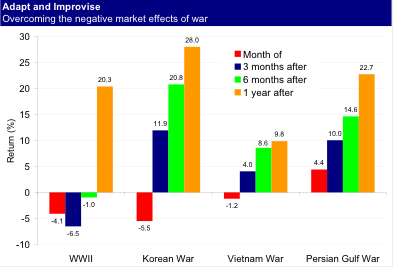 From: Ibbotson Associates When Hawks Prey on Bulls
War can stir uncertainty in the marketsThe negative effects of war or the threat of war are often reflected in the stock market, at least in the short term. The image below examines stock market performance during and immediately after the start of World War II, the Korean War, the Vietnam War, and the Persian Gulf War. In the month that each war started for the United States, the uncertainty is evident. Although the long-term effects are more difficult to ascertain, history has shown that by six months and one year after the start of a war, the stock market found a way to overcome its ravages. Long-term effects are hard to measure  Don't abandon investment planning during times of war The beginning of a war or even major events during a war may have short-term effects on market returns, but over time stock market performance is really affected by a variety of different factors. Stay committed to your long-term investment plan during troubled times. Note: Dates for the "month of" the event: WWII - Pearl Harbor, December 1941; Korean War - North Korea invaded South Korea, June 1950; Vietnam War - Gulf of Tonkin incident, August 1964; Persian Gulf War - Operation Desert Storm, January 1991. This is for illustrative purposes only and not indicative of any investment. The data assumes reinvestment of all income and does not account for taxes or transaction costs. Stocks are not guaranteed and have been more volatile than other asset classes. An investment cannot be made directly in an index. Past performance is no guarantee of future results. Source: Stocks--Standard & Poor's 500®, which is an unmanaged group of securities and considered to be representative of the stock market in general. See Also: U.S. Markets after Tradegy | 







